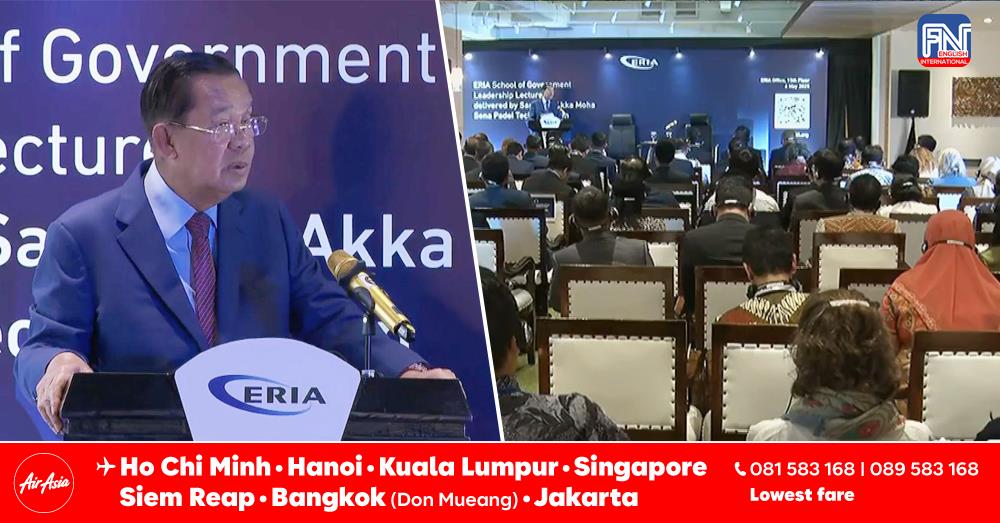(Jakarta): Cambodian Senate President, Samdech Techo Hun Sen outlined three key lessons drawn from Cambodia’s experience in leading peacebuilding and national reconciliation efforts.
Samdech Techo delivered a lecture titled “Visions and Experiences in Cambodia’s Peacebuilding Efforts” at the ERIA School of Government in Jakarta, Indonesia.
Reflecting on the creation of the win-win Policy in 1996, Samdech Techo highlighted its foundation on three core guarantees and the strategic dismantling of the Khmer Rouge command structure through the DIFID strategy. While the policy proved successful for Cambodia, he cautioned that it may not be applicable to other nations due to differing circumstances.
Nevertheless, Samdech Techo offered the following three lessons from Cambodia’s peacebuilding journey:
1. National ownership of destiny. Samdech Techo underscored the importance of national ownership in shaping a country’s future. He noted that when a nation loses control over its destiny, it risks fragmentation and disaster. Peace processes, he stressed, must begin with the people and national stakeholders. Sustainable peace can only be achieved through the engagement of citizens and all armed factions, across political lines, towards national unity and the establishment of a unified armed force.
He underlined that despite foreign support and UN assistance, long-lasting peace in Cambodia would not have been possible without the initiative and determination of the Cambodian people themselves. This embodies the essence of the win-win policy: a solution initiated, implemented, and ultimately benefiting Cambodians.
2. The International community must protect existing peace rather than rebuild lost peace. While war is easy to start, Samdech Techo reminded that it took nearly 30 years to end Cambodia’s civil war. Today, the country has enjoyed 26 years of uninterrupted peace, the longest in its 500-year history. Despite this achievement, Cambodia has faced criticism for consistently highlighting the importance of peace and warning against threats of war.
He expressed concern that some youths are beginning to take peace for granted and even support calls for regime change through undemocratic means, regardless of the consequences. He warned that such attitudes are deeply dangerous and urged the international community to condemn extremist ideologies.
Samdech Techo stressed the need to educate the public, especially young people, on the value of peace. Without peace, discussions on human rights, democracy, or development become meaningless. He stated that it is far better to protect existing peace than to attempt to rebuild it once lost.
3. Peace cannot last without national reconciliation, justice, and sustainable development. Samdech Techo affirmed that achieving peace is only the beginning. For it to endure, a country must pursue national reconciliation, justice, and inclusive development. Drawing from Cambodia’s post-conflict experience, he highlighted the need for continuous efforts to embed peace deeply within society through unity and reconciliation.
He also underlined the importance of fostering a Culture of Dialogue in Cambodia’s political life. Given the country’s history of violent conflict and repeated regime changes through undemocratic means, promoting dialogue is essential to prevent cycles of revenge and instability.
Even after full peace was achieved in 1998, Samdech Techo said he continued to engage in dialogue with opposition parties to build harmony, reinforce national unity, and strengthen democracy.
Reiterating Cambodia’s position, Samdech Techo underlined by saying that democracy is a system that respects diversity and provides peaceful means to resolve political differences, through ballots, not bullets, violence, or rebellion.
=FRESH NEWS





